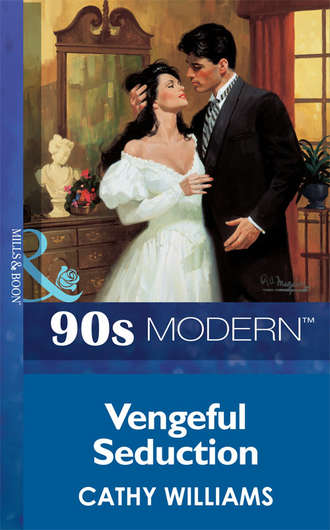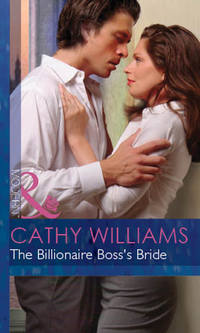
Полная версия
Vengeful Seduction
‘Where is this getting us, Lorenzo?’ she asked, doing her utmost to keep the misery out of her voice.
‘You’re catapulting yourself headlong into disaster,’ he grated, a dull red flush spreading over his cheeks. ‘There is still time to get out of its path.’
This, she knew, was the closest he would ever get to begging, and it made every bone in her body ache with the craving to do just what he asked.
Everything he had said about Jeremy was true. Jeremy had been obsessed with her. He had singled her out and it had never really occurred to him that his privileged background, which had bought him everything, couldn’t similarly buy him her. He had proposed to her when she was sixteen, still at school, while he had been at university, four years her senior. She had laughed. Now the joke was on her.
‘I will marry Jeremy——’ she looked at her watch ‘—in less than thirty minutes’ time,’ she said in a whisper, ‘and that’s all there is to it.’
His lips tightened and his expression changed subtly from anger to contempt. She didn’t know which she hated more.
‘I never took you for a coward or a fool, Isobel Chandler, but I’m rapidly revising my opinion.’
‘People are more complex than you give them credit for,’ she said in a low voice.
‘What are you trying to say to me?’ His eyes glinted and the sun, streaming in behind him through the large bay window, gave him a brooding, dangerous air that frightened and excited her. He had always frightened and excited her, she realised. He had walked into that school and she had been open-mouthed. She and every other girl in the class. They had been a group hesitatingly crossing the dividing line between childhood and adulthood, realising with an uncertain thrill that boys were not quite as uninteresting as they had once assumed. Lorenzo Cicolla with his bronzed skin and his black hair, four years older but vastly more mature than the other boys of his own age, had captivated their imagination. They had giggled from the sidelines, observed him from the distance with the blushing innocence of youth.
The fact that he had not looked at her, at any of them, even with the mildest of curiosity, had only added to his appeal. In fact, it was only when she was sixteen, ironically through Jeremy, that they had struck up a tentative friendship and he had admitted, with amusement at her reaction, that he had always noticed her. He might have been young, but he had already cultivated the dark, intense composure that had hardened as he got older.
‘I’m not trying to say anything.’
‘No? Why do I get the impression that you’re talking in riddles?’
‘I have no idea.’ She shrugged but her hands were trembling, and she quickly stuck them behind her back and clasped them together.
‘What did those letters say?’
She gave him a blank look, and then realised what he was talking about. She might have guessed that he would not have left for too long her unwary admission that Jeremy had written to her. There had only been one letter, but she wasn’t going to tell him that.
‘This and that,’ she muttered uncomfortably. ‘Why are we going through this?’
‘Be more specific.’
‘I can’t. I don’t remember.’
‘Ah.’ His face cleared and he shot her a cruel, cold look. ‘You can’t remember what was said in those letters, yet you still decided to marry the man.’
‘No! You don’t understand! You’re putting words into my mouth,’ she said in confusion.
‘Can you blame me, dammit?’ He gripped her and his eyes were so ferocious that she was terrified that he would do something awful, shake her until she came apart. She opened her mouth to protest and his lips met hers in a kiss that was fuelled by anger.
Isobel whimpered and pushed at him and eventually he stood back and stared down at her.
‘What’s the matter, Isobel?’ he asked, his mouth twisting. ‘Can’t you bear to bid a fond farewell to your lover?’
‘Stop it!’ she moaned. She felt close to tears. When she had first told him about Jeremy, he had been angry, but proud. Too proud to question. He had stormed out of her university flat and had not returned. Time had obviously worked on his fury, stoking it. It was a strange, back-handed compliment to her, but one she would rather have avoided.
‘Why?’ he snarled.
‘You know why! I belong to Jeremy now. It’s just the way it is.’
He turned away abruptly, but not before she caught the hatred that her remark had aroused. She realised, because she knew him so well, that she had not phrased her heated reply in the most tactful way possible, but just then, with her passions threatening to soar out of control, she had had to say something that would deflect him from realising how powerful his effect on her still was.
She made a stilted move towards him, then there was a knock on the door and she sprang back as though she had been burned.
It was her father. He came into the room and gave them a puzzled look, in answer to which Lorenzo said, in a normal voice, as though nothing had happened between them, ‘Just wishing the bride good luck. I doubt I shall see much of her once the wedding is under way, and we’ve known each other for so long and——’ he faced her with a smile even though his eyes were as hard as diamonds ‘—so well, that I thought a private last farewell would be in order.‘
Her father came into the room, oblivious to the undercurrents, and nodded with genial understanding.
‘Quite understand, my dear fellow,’ he said warmly. He had always liked Lorenzo. ‘Lucky chap, getting this beautiful daughter of mine.’
Lorenzo looked at her with icy courtesy. ‘I don’t know whether luck had a great part to play in it. Love, perhaps, wouldn’t you say, Isobel?’
‘Yes, of course,’ she said, reaching out to hold her father’s hand. She couldn’t look at Lorenzo. That would have been a Herculean feat quite beyond her just at that moment.
‘Well, dear girl, luck or love doesn’t change the fact that your time has come.’ Her father cleared his throat and patted her hand and she thought how true his unwitting choice of expression was. ‘I hope you’re not feeling too dicky. I need your support or else I might just collapse with nerves before we make it to the altar.’ He turned to Lorenzo with a grin. ‘Wait until you’re my age and your daughter is about to marry. You’ll soon discover what nerves are all about. I’ve addressed enough roomfuls of people, but I’ve never felt this fraught before.’ He rested his hand on his stomach. ‘Viola says that it’s indigestion caused by trying to fit my frame into this outfit. Mothers! Don’t know a thing.’ His voice held the same level of tender affection when he spoke of his wife as hers did when she spoke of him.
‘Try telling them that,’ Lorenzo said drily. ‘My mama has always maintained that she rules the roost, which, of course, she does.’ They both laughed at this and Isobel forced her lips into a mimicry of a smile.
‘Well, my dear, shall we go down and make our grand entrance?’ He looked at Lorenzo. ‘Jeremy has been looking for you. Told him I didn’t know whether you’d arrived or not. Didn’t know that you were up here, paying your last respects, so to speak.’ He had moved towards the door, his mind already on the task ahead, and he missed their various reactions to Jeremy’s name.
Isobel clutched his hand and they stood aside so that Lorenzo could leave first, which he did, taking the steps two at a time. She heard his footsteps fading along the marble hallway and felt a dreadful sense of resignation, as if she had aged fifty years in the space of half an hour.
The wedding-ceremony and the reception were both being held in the massive yellow and white marquee, which had been connected to the back doors. She wouldn’t even have the impersonal, imposing view of the inside of a church to fall back on. No, in the marquee they would all be standing close together, too close. Her mother had thought it a wonderful idea, and with cheerful apathy Isobel had agreed. Now she wished that she hadn’t.
She and her father walked sedately down the winding staircase, through the hallway, into the grand apricot and green drawing-room, which had efficiently been cleared of empty glasses and full ashtrays by some of the hired help, and finally through the open French doors and into the marquee, and the further they progressed, the stiffer Isobel felt.
By the time they reached the marquee, and all eyes swivelled in their direction, she felt dead inside. She stared straight ahead, not meeting anyone’s eye, least of all her dissenting clique of friends who had all, naturally, convened in the front row. Out of the corner of her eye she spotted Abigail—straight blonde hair, firm features, disapproving eyes.
Ahead she saw Lorenzo, dark and deadly and staring at her with a veiled contempt which only she would recognise. And beyond him Jeremy, dear, obsessed Jeremy, whose fate would now be entwined with hers forever.
CHAPTER TWO
THE accountant was saying something. Isobel looked at him and tried to focus her mind on what was happening. Next to her, her mother sat like a statue on the flowered upright chair, leaning forward slightly, her body stiff as board, her face set in lines of pain. She had been like this for the past three months. Her body moved, her mouth spoke, but the soul had gone out of her.
‘It’ll take time,’ Richard Adams had told Isobel in the privacy of the surgery. ‘She’ll go through all those emotions of anger, despair, shock, disbelief, but she’s strong enough to pull through. In time.’
Isobel looked at the unmoving figure with distress, and wondered whether her mother’s strength hadn’t been over-exaggerated.
‘I advise you strongly to sell,’ the accountant was saying, flicking through his paperwork.
‘Sell?’ Isobel shot him a dazed look, and he shook his head impatiently. He was a small man, balding, with quick, darting eyes and a manner that implied constant nervous movement. He was efficient, though. He and his team of two had run through her father’s accounts like torpedoes—dispassionately, ruthlessly.
‘Your father’s company has its head above water at the moment,’ Mr Clark said, his fingers twitching over the paperwork. ‘But only just. There has been some shocking mismanagement over the past few years. Not,’ he added hurriedly, seeing Mrs Chandler’s face turn towards him in sad, pained accusation, ‘because of anything Mr Chandler did. After all, he had virtually resigned by the time…Yes, well, we often find that this is a problem in family firms. They employ friends, and there’s altogether too much trust and too little ruthlessness. It shows in the company accounts eventually.’ He sat back, crossed his legs, linked his fingers together on his lap, and fixed them with what was, for him, a relatively serene stare.
‘The fact of the matter is that the company has been left jointly to you both, but it would be madness to continue running it keeping on some of the management who are currently employed there. In no time at all it would cease to be a going concern, and then if you did decide to sell it would fetch you next to nothing. It would become the victim of a predator looking for a dying company to dissect. Simple as that.’
Isobel looked at her mother and said gently, ‘You go, Mum. You look tired.’
Mrs Chandler forced a smile on to her face. ‘No, of course not, darling. After all, this affects me as well.’ She made a small, despairing gesture with her hands and lapsed back into silence.
‘I have a prospective buyer already,’ Mr Clark said bluntly, ‘and I suggest that you give very serious thought to selling to him. He has offered an absurdly generous price. You and your mother could retire millionaires.’
That was not a well-chosen remark. Mrs Chandler looked away with tear-filled eyes and said in a choked voice, ‘The money means nothing at all to me, to us. It won’t bring David back, will it? Or…’ She couldn’t go on. She began to sob quietly, resting her forehead in her hands, and Isobel hurried over to her side and wrapped her arms around her. She had hardly had time herself to grieve. She had had to carry her mother through her grief; she had had to be strong for her.
She made a silent, brushing gesture over her mother’s head to Mr Clark, who awkwardly rose to his feet, cleared his throat and muttered a belated, red-faced apology.
‘Wait in the hall for me, Mr Clark,’ Isobel said briefly, and he nodded and left noiselessly through the drawing-room door.
‘I’m sorry, my darling,’ Mrs Chandler said, ‘I know I should be pulling myself together.’ She raised her red eyes to Isobel, who tried to maintain a strong, reassuring face when she felt like breaking up inside. ‘You poor love.’ She managed a watery smile which made Isobel feel worse. ‘I’ve been no comfort to you, have I?’
‘You always are. Whatever you do.’
‘Your loss has been double,’ she sighed, and then said finally, ‘Run along, darling, see what Mr Clark suggests. I’ll leave it all to you.’
Isobel hesitated, but only for a moment. Things needed to be sorted out. The issues which Mr Clark had raised left no time for grief. Life continued to march on, demanding involvement. It had no respect for death.
Mr Clark was waiting patiently in the hall when Isobel went out to join him. She ushered him through to the kitchen, poured him some coffee, which he accepted with alacrity, and then took the chair facing him across the kitchen table.
‘Who is the buyer, Mr Clark?’ she asked, coming to the point, and he relaxed. Displays of emotion, she suspected, made him uneasy. He was only at home when discussing work.
‘I have been dealing with a Mr Squires from London,’ he said, sipping his coffee. ‘There have, in fact, been several poachers waiting on the sidelines. Your father’s business may have been mismanaged, but it still has considerable potential and an impressive client portfolio.’
‘That being the case, what is there to stop me from running the business myself?’
‘Knowledge.’ He carefully placed the cup on the saucer, fixed her with those quick eyes, and said with clipped certainty, ‘Good intentions won’t make a success out of a business. Most of the hierarchy in your father’s firm will have to be sacked. Many of them are friends of the family. Could you do that? Your training, if you don’t mind my pointing it out, is not financial. Of course, I can only advise, but keeping the company going under your own auspices, merely for sentimental reasons, is not going to do much good. In the end, if it dissolves, you will see the loss of a great many more jobs than those which will be lost should you sell now.’
Isobel thought about that. What he said made sense. Everything he had said over the past few weeks made sense. Mr Clark, it had to be faced, was an eminently sensible man.
‘When,’ she asked, ‘will you need my answer?’
‘The sooner the better.’
She nodded and stood up, and he followed suit, collecting his various files and stacking them into his briefcase. He had come well-prepared. Statistics had been shown her, profit and loss columns had been methodically pointed out, budgets analysed, and he had been right: she knew very little about finance. In time, she was sure, she could get to grips with it, but ‘in time’ might not be soon enough, and she knew that it would have broken her father’s heart to witness the dissolution of his beloved company. Better for it to carry on in a different form. Wasn’t it?
She showed Mr Clark out, looked in on her mother, who had fallen into a fitful sleep on the chair, and then retreated to the library to think.
It was so hard being strong, she thought wearily. Decisions had to be made and her mother, she knew, was in no fit state to make them.
Isobel sat back in the leather swivel chair and closed her eyes. Memories were the worst. Her father sitting her on his knee when she was a child, going for walks with her, patiently telling her about the various plants and trees in the garden.
She didn’t sob like her mother. The tears squeezed themselves out, but she didn’t brush them away. They fell on to her hands, on her lap, her dress.
That dreamlike feeling of unreality which had first dogged her had gone. Now she could think of the policeman at the door, breaking the news to them that there had been a car accident, that both occupants had been killed outright, without trying to convince herself that she would wake up at any moment and find that it had only been a terrible nightmare.
Jeremy had been at the wheel of the Jaguar. He had been overtaking another car and had been hit by an oncoming lorry. He had been over the limit.
She had tried very hard, but bitterness towards him had overlaid any pain she might have felt. He had ruined her life.
The following morning she telephoned Mr Clark and told him to go ahead with the sale of the company.
‘You have my trust in this matter, Mr Clark,’ she said down the line. ‘I will sign whatever needs signing, but I want no involvement beyond that.’
Her mother was out for the day, taken under wing by Jeremy’s mother, who had been distraught at the funeral but over the past weeks had been a source of strength to Mrs Chandler. They were going to have tea in one of the coffee-shops in the village.
That left Isobel on her own, and she made her way back to her own house. Ever since the accident she had been living with her mother, and it had been something of a relief.
The house she had shared with Jeremy, even after four years of marriage, had never felt like a home. She had looked after the gardens, arranged flowers in vases, hung paintings, but it had still remained a stiff, empty shell. A house could never become a home without love to fill it, and love was something that had been conspicuous by its absence.
She pushed open the front door, stooped down to collect the dribs and drabs of mail, and then, unemotionally, she resumed her sporadic job of packing Jeremy’s clothes into boxes which she had retrieved from the attic. She should have done it sooner, weeks ago, but time had flown past so quickly.
Suits, ties, trousers, jumpers, shirts. She would give them all to charity.
It had all been so pointless. She could remember being twenty, being in love, Lorenzo. Her throat constricted. Of course that had been another life, and she had got over him. Time healed everything; that much was true.
She hadn’t even had the reminder of his mother, because Mrs Cicolla had emigrated to America to be with her son three years previously.
She could still remember that dead, sickly feeling that had spread over her when he had announced at the wedding, not to her but to her parents, that he had decided to emigrate.
‘Within a fortnight,’ he had said casually, his hand in his pocket, his eyes not looking at her at all, eliminating her from his life in one fell swoop. Ex-lover with another man’s ring on her finger. No longer worth so much as token politeness.
That had been four years ago, but the memory was as clear as if it had been only yesterday, only a few hours ago.
She heard the buzz of the doorbell and ran down the stairs to answer it. Abigail. Isobel’s face broke into a smile of pure joy. She hadn’t seen Abigail, apart from briefly at the funeral three months ago.
‘I tried your mum’s house first,’ Abigail said, coming inside, ‘and when there was no reply, I thought that you might be here.’ She looked sympathetically at Isobel. ‘Do you need a hand with anything?’
They went upstairs and continued boxing the clothes, chatting. Abigail’s status, in the space of only a few years, had reached mammoth proportions. She was in the newspapers all the time, her movements shadowed and faithfully, or unfaithfully, reported back on.
‘How’s your mum coping?’ she asked casually, and Isobel paused to look at her.
‘Not very well,’ she answered truthfully. ‘She seems to have retreated into herself.’
‘It’s understandable.’
‘She doesn’t even venture out into the garden. She says every blade of grass reminds her of him.’
Abigail didn’t say anything for a while. ‘And you, Izzy?’ She looked away and busied herself with stuffing more clothes into boxes. Jeremy had had a lot of clothes. He had liked dressing the part of the wealthy landowner.
‘He’s in my mind,’ Isobel said in a low voice.
‘And Jeremy?’
Isobel stood up, dusted herself down and replied shortly, ‘You know that he caused the accident. The coroner told me that in privacy. I asked him if he could withhold the information from his parents, and from Mum.’
‘You always hated him, didn’t you?’
‘No.’ Isobel thought about it, for the first time putting into words what had never been said before. ‘He trapped me into marriage, and please don’t ask me how or why.’ Those papers. She frowned. Where were they? He must have hidden them somewhere. They could not have vanished into thin air. Oh, no. He would never have been so careless as to misplace them—after all, they were the stick to be waved over her if ever she thought of desertion. ‘Of course I hated him to start with, but you can’t hate forever. It’s too tiring. After a while, the instinct for self-preservation takes over or else you would just go mad.’ She shrugged and they went down to the kitchen to have some coffee.
It helped having someone to talk to. It made her co-ordinate her thoughts, and Isobel found herself telling Abigail about Mr Clark’s offer, what she intended to do with her house, her job.
‘I might even contemplate finding out whether I can’t complete some kind of medical course, take it up,’ she said, blushing. ‘Richard thinks it’s a good idea.’
‘Richard?’ Abigail’s eyebrows quirked. ‘Dr Adams, you mean?’
‘He’s very encouraging.’
‘And, so that’s how the land lies.’
‘Of course not!’ Isobel laughed. ‘You and that dramatic mind of yours! Richard and I are simply good friends. He’s been kind to me over the years.’
And they left it at that. Abigail departed late that evening and Isobel returned to find her mother in better spirits than she had been for weeks.
‘Emily is helping me to put everything in perspective, the dear woman,’ she said, sipping tea and picking bits of salad from her plate like a choosy bird deliberating over which morsels to consume. ‘David is gone, and hiding myself away isn’t going to change that. I’ve spent too long hiding. I want to start thinking about tomorrow. What did Mr Clark say?’
So Isobel told her, and the following morning, by some uncanny coincidence, he telephoned to inform her that the purchaser had arrived and would she come down to his offices on the High Street to sign some bits of paper.
Isobel dressed carefully for the occasion. A sober grey wool suit, because the chill of autumn was in the air, her pearls, cream-coloured shoes.
She looked in the mirror and saw the reflection of a twenty-four-year-old woman, nearly twenty-five, who, in the midst of loss, now found herself on the brink of freedom for the first time in four long years.
She smiled, and the image smiled back, showing her what she hadn’t seen for a very long time. The same stunning face, but with the black hair trimmed to a bob, a tall, lithe body, eyes that were a little sad, as though they had seen too much.
She swept out of the house, feeling better than she had done for a while, and arrived at Mr Clark’s offices well in time.
Mr Squires wasn’t there. Isobel drank coffee, made small talk to the accountant, and began to feel slightly annoyed that she was being kept waiting. Hadn’t this man heard of common politeness?
She glanced at her watch and caught Mr Clark’s eye. He was looking worriedly at his own watch. Presently he stood up, and said that he would go and have a look to see what had happened to the gentleman in question.
‘Perhaps he’s lost,’ he volunteered politely, to which she was tempted to point out that he could only have found himself lost in a town the size of theirs if he was a mental incompetent, in which case was she really doing the right thing by selling him her father’s company?







